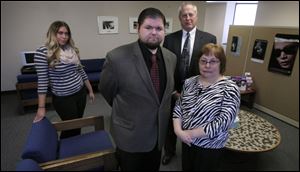
Prosecutors move to encourage testimony
Court offers discreet waiting room for domestic violence victims
3/17/2014
Domestic violence court runner Elizabeth Bolduc, left, chief prosecutor Dave Toska, back, and prosecutors Chris Lawrence and Sharon Gaich show off Municipal Court’s new waiting room.
City prosecutors have improved their batting average for convictions in cases where victims of domestic violence are unwilling or too afraid to testify against their batterers.
Still, the office is trying new ways to encourage domestic-violence sufferers to come to court and tell their sides of the stories.
“We’re hoping that the evidence-based prosecutions become less, and the victim-supported prosecutions become more,” said Dave Toska, Toledo’s chief prosecutor. “And we’re fully understanding of why victims don’t appear. There are a lot of very good reasons why they don’t — from economics to fear to intimidation.”
Toledo Municipal Court recently opened a secure, out-of-the-way waiting room where victims may go before a court hearing, meet with one of the city’s two prosecutors who specialize in domestic-violence cases, and then be escorted to court when their alleged batterer’s case is called.
“We’re hoping that having a comfortable place, not out in the mainstream, will allow these folks some sense of security and comfort that they may start attending because we bring them here for every appearance. They never have to go directly to the courtroom,” Mr. Toska said. “If it’s a trial, a pretrial, if it’s a sentencing, they come here first and then we’ll give notice to the prosecutor that we have them and the prosecutor will call them when they’re ready.”
The prosecutor’s office knows all too well how uncomfortable victims were in the past. Offenders and their relatives, as well as victims, line the often-crowded hallways outside the municipal courtrooms.
Sharon Gaich, who staffs the prosecutor’s domestic-violence unit with Chris Lawrence, said before the waiting room opened, she and other prosecutors interviewed victims in the hallway or in an attorney conference room if one was available.
The court handles close to 2,000 domestic-violence cases a year, and, on average, victims show up to testify less than 30 percent of the time.
Judge William Connelly, Jr., presiding judge of Toledo Municipal Court, said the judges were supportive of the new waiting room, which previously was used as a waiting area for prospective jurors.
“The value is that anyone involved in a domestic-violence situation has already been through a very traumatic event,” Judge Connelly said. “We cannot completely eliminate the trauma, but if we can help to shield the victims from further trauma, I think the domestic-violence waiting room will help accomplish that.”
The well-lit space, which includes comfortable seating and restrooms, also has brochures offering services to victims. Posters advertising a hot line sponsored by the Family Violence Prevention Fund carry messages such as “Nobody deserves to be abused” and “No matter what he says, the abuse is not your fault.”
Notices and subpoenas in domestic violence cases now direct victims to the waiting room on the third floor, and Toledo police plan to update forms they give victims at violence scenes to include information about the waiting room.
Mr. Toska said it will likely take at least six months to see if the waiting room and new procedures have a positive impact on the court’s conviction rate and the number of victims who participate. But even without the cooperation of victims, he said, his office is committed to going forward.
“In the past — and I’m talking 10, 15 years ago — it was just almost understood that when a victim didn’t appear, the case was dismissed,” Mr. Toska said. “That’s what we’re trying to get away from. Offenders would even tell their victims not to appear … now we’re going forward where we can.”
Mr. Lawrence said he has taken at least 10 cases to trial relying on 911 tapes, photographs, medical records, and jail records rather than a victim’s testimony. In February, two of three domestic-violence trials that proceeded without victims resulted in convictions. “That’s a .667 batting average,” he said.
Contact Jennifer Feehan at: jfeehan@theblade.com or 419-213-2134.